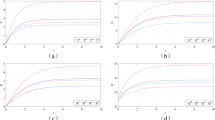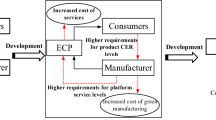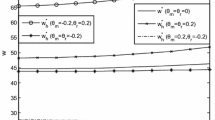Abstract
This paper explores the manufacturer’s carbon emission reduction in the presence of network externalities and altruistic preferences. Existing literature mainly analyzes the impact of government regulations and firms’ behavior characteristics on manufacturers’ decisions, while little literature investigates the role of network externalities and altruistic preferences in promoting carbon emission reduction of manufacturers. Our results show that network externalities and altruistic preferences are conducive to improving manufacturers’ profits and carbon emission reduction levels. However, we find that manufacturers’ carbon emission reductions are more likely to be optimal without network externalities and altruistic preferences when the cost of low-carbon technologies is low, and consumer preferences are high. Interestingly, when the low-carbon technologies cost is high, the combined effect of network externalities and altruistic preferences is more favorable for manufacturers to implement carbon emission reductions. However, when the cost of low-carbon technologies is moderate, we find that the combined effect of network externalities and retailers’ altruistic preferences does not always increase the level of carbon emission reductions. In addition, we also find that network externalities or altruistic preferences enhance manufacturers’ ability to afford the costs of low-carbon technologies, which implies that manufacturers are more inclined to reduce carbon emissions compared to scenarios without network externalities and altruistic preferences.








Similar content being viewed by others
Data availability
Data sharing is not applicable to this article as no datasets were generated during the current study.
References
An S, Li B, Song D, Chen X (2021) Green credit financing versus trade credit financing in a supply chain with carbon emission limits. Eur J Operation Res 292:125–142
Anderson EG, Parker GG, Tan B (2014) Platform performance investment in the presence of network externalities. Inform Syst Res 25:152–172
Bai QG, Chen MY, Xu L (2017) Revenue and promotional cost-sharing contract versus two-part tariff contract in coordinating sustainable supply chain systems with deteriorating items. Intl J Prod Econ 187:85–101
Basak D, Petrakis E (2021) Social efficiency of entry: implications of network externalities. J Econ Manage Strat 30:820–829
Bhardwaj N, Lal (2012) Consumer buying behaviour toward carbon labelling (FMCG) in Tesco supermarket. Intl J Data Netw Secur 1:1–11
Brandenburg M (2015) Low carbon supply chain configuration for a new product - a goal programming approach. Intl J Prod Econ 53:6588–6610
Cao E, Yu M (2019) The bright side of carbon emission permits on supply chain financing and performance. Omega 88:24–39
Chen YJ, Zenou Y, Zhou JJ (2018) Competitive pricing strategies in social networks. RAND J Econ 49:672–705
Cheng HK, Liu YP (2012) Optimal software free trial strategy: the impact of network externalities and consumer uncertainty. Inform Syst Res 23:488–504
Cohen MC, Harsha P (2020) Designing price incentives in a network with social interactions. Manuf Serv Operations Manage 22:292–309
Dou GW, Choi TM (2021) Does implementing trade-in and green technology together benefit the environment? Eur J Operation Res 295:517–533
Du CH, Cooper WL, Wang ZZ (2016) Optimal pricing for a multinomial logit choice model with network effects. Operations Research 64:441–455
Du SF, Nie TF, Chu C, Yu YG (2014) Reciprocal supply chain with intention. Eur J Operation Res 239:389–402
Fainmesser IP, Galeotti A (2020) Pricing network effects: competition. Am Econ J Microecon 12:1–32
Fan RG, Lin JC, Zhu KW (2019) Study of game models and the complex dynamics of a low-carbon supply chain with an altruistic retailer under consumers’ low-carbon preference. Physica Stat Mech Appl 528:121460
Feng H, Zeng Y, Cai X, Qian Q, Zhou Y (2021) Altruistic profit allocation rules for joint replenishment with carbon cap-and-trade policy. Eur J Operation Res 290:956–967
Ge ZH, Hu Q (2012) Who benefits from altruism in supply chain management. Am J Operations Res 2:59–72
Gopalakrishnan S, Granot D, Granot F, Sošić G, Cui HL (2021) Incentives and emission responsibility allocation in supply chains. Manage Sci 67:4172–4190
Guo L, Meng XY (2015) Digital content provision and optimal copyright protection. Manage Sci 61:108–112
Guo J, Huang RB (2021) A carbon tax or a subsidy? Policy choice when a green firm competes with a high carbon emitter. Environ Sci Pollut Res. https://doi.org/10.1007/s11356-020-12324-4
He P, Wang ZB, Shi V, Liao Y (2021) The direct and cross effects in a supply chain with consumers sensitive to both carbon emissions and delivery time. Eur J Operation Res 292:172–183
Huang JL, Mani A, Wang ZZ (2021) The value of price discrimination in large social networks. Manage Sci. https://doi.org/10.1287/mnsc.2021.4108
Jian M, He H, Ma CS, Wu Y, Yang H (2019) Reducing greenhouse gas emissions: a duopoly market pricing competition and cooperation under the carbon emissions cap. Environ Sci Pollut Res 26:16847–16854
Li XX, Chen YX (2012) Corporate IT standardization: product compatibility, exclusive purchase commitment and competition effects. Inform Syst Res 23:1158–1174
Lin ZB (2018) Price and location competition in supply chain with horizontal altruistic retailers. Flex Serv Manuf J 31:255–278
Liu WH, Yan XY, Wei WY, Xie D, Wang D (2018) Altruistic preference for investment decisions in the logistics service supply chain. Eur J Industr Eng 12:598–635
Liu XH, Qian C, Wang SH (2020) When do 3PLs initiate low-carbon supply chain integration? Intl J Operations Prod Manag 40:1367–1395
Liu Z, Li M, Kou J (2015) Selling information products: sale channel selection and versioning strategy with network externality. Intl J Prod Econ 166:1–10
Loch CH, Wu Y (2008) Social preferences and supply chain performance: an experimental study. Manage Sci 54:1835–1849
Luo Z, Chen X, Wang XJ (2016) The role of co-opetition in low carbon manufacturing. Eur J Operation Res 253:392–403
Meng XG, Yao Z, Nie JJ, Zhao YX, Li ZL (2018) Low-carbon product selection with carbon tax and competition: effects of the power structure. Intl J Prod Econ 200:224–230
Papier F, Thonemann UW (2021) The effect of social preferences on sales and operations planning. Operations Res 69:1368–1395
Peng QY, Wang CX, Xu L (2020) Emission abatement and procurement strategies in a low-carbon supply chain with option contracts under stochastic demand. Comput Indust Eng 144:106502
Qiu R, Xu J, Ke R, Zeng Z, Wang Y (2020) Carbon pricing initiatives-based bi-level pollution routing problem. Eur J Operational Res 286:203–217
Qu SJ, Yang H, Ji Y (2021) Low-carbon supply chain optimization considering warranty period and carbon emission reduction level under cap-and-trade regulation. Environ Dev Sustain 23:18040–18067
Rong, L. Q., and Xu, M. Z. (2021). Impact of altruistic preference and government subsidy on the multinational green supply chain under dynamic tariff. Environ Dev Sustain https://doi.org/https://doi.org/10.1007/s10668-021-01514-w.
Shen B, Cao Y, Xu X (2020) Product line design and quality differentiation for green and non-green products in a supply chain. Intl J Prod Res 58:148–164
Simon JR, Saari DG, Keller LR (2020) Interdependent altruistic preference models. Decision Analysis 17:189–207
Tavana M, Tohidi H, Alimohammadi M, Lesansalmasi R (2021) A location-inventory-routing model for green supply chains with low-carbon emissions under uncertainty. Environ Sci Pollut Res 28:50636–50648
Viswanathan S (2005) Competing across technology-differentiated channels: the impact of network externalities and switching costs. Manage Sci 51:483–496
Wang C, Peng Q, Xu L (2021a) Decision and coordination of a low-carbon supply chain considering environmental tax policy on consumers. Kybernetes 50:2318–2346
Wang H, Wang L, Ding Q (2022) Manufacturers’ product line strategies and environmental impacts under carbon cap and trade policies. Environ Sci Pollut Res. https://doi.org/10.1007/s11356-021-17909-1
Wang M, Li Y, Li M, Shi W, Quan S (2019) Will carbon tax affect the strategy and performance of low-carbon technology sharing between enterprises? J Clean Prod 210:724–737
Wang Q, Zhao D, He L (2016) Contracting emission reduction for supply chains considering market low-carbon preference. J Clean Prod 120:72–84
Wang YY, Fan RJ, Shen L, Miller W (2020) Recycling decisions of low-carbon e-commerce closed-loop supply chain under government subsidy mechanism and altruistic preference. J Clean Prod 259:120883
Wang YY, Yu ZQ, Jin MZ, Mao JF (2021b) Decisions and coordination of retailer-led low-carbon supply chain under altruistic preference. Eur J Operational Res 293:910–925
Wu T, Zhang M, Tian X, Wang SY, Hua GW (2020) Spatial differentiation and network externality in pricing mechanism of online car hailing platform. Intl J Prod Econ 219:275–283
Xia LJ, Guo TT, Qin JJ, Yue XH, Zhu N (2018) Carbon emission reduction and pricing policies of a supply chain considering reciprocal preferences in cap-and-trade system. Ann Operations Res 268:149–175
Xia TS, Wang YY, Lv LX, Shen L, Cheng TCE (2022) Financing decisions of low-carbon supply chain under chain-to-chain competition. Intl J Prod Res. https://doi.org/10.1080/00207543.2021.2023833
Xu B, Yao Z, Wu SY (2020b) Pricing strategies for a bundled channel with services network effects. Intl J Prod Res 59:3152–3168
Xu B, Yao Z, Tang P (2018b) Pricing strategies for information products with network effects and complementary services in a duopolistic market. Intl J Prod Res 56:4243–4263
Xu C, Wang C, Huang R (2020a) Impacts of horizontal integration on social welfare under the interaction of carbon tax and green subsidies. Intl J Prod Econ 222:107506
Xu L, Li YJ, Govindan K, Yue XH (2018a) Return policy and supply chain coordination with network-externality effect. Intl J Prod Res 56:3714–3732
Yang L, Zhang Q, Ji JN (2017) Pricing and carbon emission reduction decisions in supply chains with vertical and horizontal cooperation. Intl J Prod Econ 191:286–297
Yenipazarli A (2019) Incentives for environmental research and development: consumer preferences, competitive pressure and emissions taxation. Intl J Prod Res 276:757–769
Yi Y, Yang H (2017) Wholesale pricing and evolutionary stable strategies of retailers under network externality. Eur J Operational Res 259:37–47
Tan B, Anderson EG, Parker GG (2020) Platform pricing and investment to drive third-party value creation in two-sided networks. Information Systems Research 31:217–239
Zhang J, Huang J (2021) Vehicle product-line strategy under government subsidy programs for electric/hybrid vehicles. Trans Res Part E-log Trans Rev 146:102221
Zhang ZY, Yu LY (2021) Joint emission reduction dynamic optimization and coordination in the supply chain considering fairness concern and reference low-carbon effect. J Industr Manage Opti. https://doi.org/10.3934/jimo.2021155
Zhou Y, Zhang J, Zeng Y (2021) Borrowing or crowdfunding: a comparison of poverty alleviation participation modes considering altruistic preferences. Intl J Prod Res 59:6564–6578
Author information
Authors and Affiliations
Contributions
Hua Wang: conceptualization, methodology, software, formal analysis, investigation, writing — original draft. Yimeng He: supervision, conceptualization, methodology, validation, resources —review and editing. Qiyan Ding: conceptualization, methodology, funding acquisition, validation, writing —review and editing. All the authors read and approved the final manuscript.
Corresponding author
Ethics declarations
Ethics approval and consent to participate
Not applicable.
Consent for publication
Not applicable.
Competing interests
The authors declare no competing interests.
Additional information
Responsible Editor: Ilhan Ozturk
Publisher’s note
Springer Nature remains neutral with regard to jurisdictional claims in published maps and institutional affiliations.
Rights and permissions
About this article
Cite this article
Wang, H., He, Y. & Ding, Q. The impact of network externalities and altruistic preferences on carbon emission reduction of low carbon supply chain. Environ Sci Pollut Res 29, 66259–66276 (2022). https://doi.org/10.1007/s11356-022-20459-9
Received:
Accepted:
Published:
Issue Date:
DOI: https://doi.org/10.1007/s11356-022-20459-9




